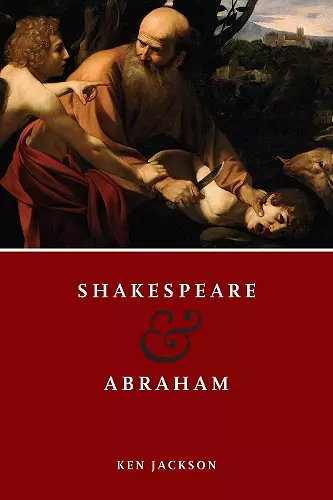Shakespeare and Abraham
Format:Paperback
Publisher:University of Notre Dame Press
Published:15th Mar '15
Currently unavailable, and unfortunately no date known when it will be back

In Shakespeare and Abraham, Ken Jackson illuminates William Shakespeare’s dramatic fascination with the story of Abraham’s near sacrifice of his son Isaac in Genesis 22. Themes of child killing fill Shakespeare’s early plays: Genesis 22 informed Clifford’s attack on young Rutland in 3 Henry 6, Hubert’s providentially thwarted murder of Arthur in King John, and Aaron the Moor’s surprising decision to spare his son amidst the filial slaughters of Titus Andronicus, among others.
However, the playwright’s full engagement with the biblical narrative does not manifest itself exclusively in scenes involving the sacrifice of children or in verbal borrowings from the famously sparse story of Abraham. Jackson argues that the most important influence of Genesis 22 and its interpretive tradition is to be found in the conceptual framework that Shakespeare develops to explore relationships among ideas of religion, sovereignty, law, and justice. Jackson probes the Shakespearean texts from the vantage of modern theology and critical theory, while also orienting them toward the traditions concerning Abraham in Jewish, Pauline, patristic, medieval, and Reformation sources and early English drama. Consequently, the playwright’s “Abrahamic explorations” become strikingly apparent in unexpected places such as the “trial” of Shylock in The Merchant of Venice and the bifurcated structure of Timon of Athens. By situating Shakespeare in a complex genealogy that extends from ancient religion to postmodern philosophy, Jackson inserts Shakespeare into the larger contemporary conversation about religion in the modern world.
“This very accessible book allows the reader to learn a great deal about major issues in biblical and Shakespearean studies in less than 200 pages.” —America
“Ken Jackson’s marvelously provocative book Shakespeare and Abraham pushes back against historiographical masterplots in which modernity is realized via secularization. . . Jackson finds, in this premodern text’s grappling with the story of Abraham, a powerful theorization of faith now made legible once again via modern and postmodern theory. This argument works strongly against periodizing ideas about medieval Christianity: it recovers something urgent in medieval though, something that has been occluded and ignored as a result of ideas about progress, secularization and modernity.” —Recent Studies in Tudor and Stuart Drama
“Jackson’s approach is not just a philological overview of overt references to Genesis, chapter 22; he makes the so-called Binding of Isaac emblematic of Shakespeare’s philosophical struggles with the relationships between religion, sovereignty, law, and justice. . . Shakespeare and Abraham is an excellent inquiry into a rather niche research question. Jackson’s reading, though novel, is very compelling, and resolves some of Shakespeare’s most perplexing moments in a way that almost seems obvious in hindsight.” —Comitatus
"While any number of books analyze Shakespeare’s plays and either his religious leanings or biblical imagery, Ken Jackson has a much tighter focus: the famously difficult Genesis 22 story of Abraham and Isaac and its echoes throughout certain of Shakespeare’s plays.” —Catholic Library World
“Jackson’s stance is less dogmatic than many of the ‘religious turn’ claims that Shakespeare was a closet Catholic . . . . The book is consistently provocative.” —Choice
"For Ken Jackson, Shakespeare is not the secular, modern writer so many critics construct: he is a deeply religious thinker. . . . Jackson's remarkable conclusion is that Shakespeare, like Kierkegaard and Derrida, points in the direction of a certain Abraham beyond Christianity and outside Western metaphysics." —Times Literary Supplement
"Not long ago, Shakespeare criticism generally cast the Bard as a protomodern secular humanist. Lately, the foundational importance of religion to his art has come to the fore. To this new critical recognition, Jackson adds a study of how the aborted sacrifice of Isaac by his father, Abraham, in Genesis 22 informs six plays—3 Henry VI, King John, Richard II, Titus Andronicus, The Merchant of Venice, and Timon of Athens—that today’s audiences and presenters alike consider difficult. . . . Jackson’s exposition . . . is hardly easy reading, but it is rich in freshening insights." —Booklist
“Ken Jackson’s timely book makes a forceful case for attending to Shakespeare’s engagement with the Abrahamic roots of monotheism as a way of looking anew at some of the most perplexing moments in the plays. Reevaluating the playwright’s attitude toward religion without getting bogged down in debates over doctrinal commitments, Jackson gives us a Shakespeare deeply invested in religious questions, if not religious controversy. Moving effortlessly among theological, literary, and philosophical works from antiquity to the present, Jackson reveals that Shakespeare’s response to Abraham raises urgent questions about the intersections of religion and culture in early modern England that are no less relevant today.” —James A. Knapp, Edward Surtz, S.J., Professor of English, Loyola University Chicago
"Ken Jackson’s powerfully argued book challenges us to rethink what religion may have meant to Shakespeare and what it may yet come to mean for us. Neither secular nor orthodox, neither skeptical nor pious, Jackson’s Shakespeare is nevertheless a passionately committed playwright deeply aware of the inescapably religious dimensions of everyday life. Through a series of startling readings, Jackson shows Shakespeare bearing witness to a desire for pure generosity that quickens even as it unsettles the three great monotheisms. Shakespeare and Abraham is high-stakes criticism sure to provoke." —Gary Kuchar, University of Victoria
"Ken Jackson's Shakespeare and Abraham poses a powerful model for how a biblical hero can be recovered within a number of divergent dramatic contexts—both Shakespearean and medieval—as well as in philosophy and theology. Writing with great clarity about challenging ideas, Jackson has led us a great deal closer to understanding the meanings that the binding of Isaac held for Shakespeare." —Julia Reinhard Lupton, University of California, Irvine
ISBN: 9780268032715
Dimensions: 229mm x 152mm x 11mm
Weight: 283g
184 pages